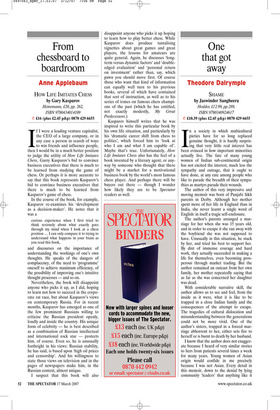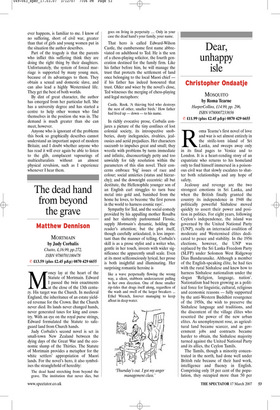One that got away
Theodore Dalrymple
SHAME by Jaswinder Sangheera Hodder, £12.99, pp.289, ISBN 9780340924617 ✆ £10.39 (plus £2.45 p&p) 0870 429 6655 In a society in which multicultural pieties have for so long replaced genuine thought, it is hardly surprising that very little real interest has been evinced in how important minorities actually live. The fate of many young women of Indian sub-continental origin has not excited the interest, much less the sympathy and outrage, that it ought to have done, at any rate among people who like to parade the breadth of their sympathies as martyrs parade their wounds.
The author of this very impressive and moving memoir was born of Punjabi Sikh parents in Derby. Although her mother spent more of her life in England than in India, she never learnt a single word of English: in itself a tragic self-enclosure.
The author’s parents arranged a marriage for her when she was 15 years old, and in order to escape it she ran away with the boyfriend she was not supposed to have. Unusually in this situation, he stuck by her, and tried his best to support her. By dint of immense courage and hard work, they actually succeeded in making a life for themselves, even becoming prosperous through market trading. But the author remained an outcast from her own family, her mother repeatedly saying that as far as she was concerned her daughter was dead.
With considerable narrative skill, the author allows us to see and feel, from the inside as it were, what it is like to be trapped in a close Indian family and the consequences of the attempt to escape. The tragedies of cultural dislocation and misunderstanding between the generations could not be more vivid. One of the author’s sisters, trapped in a forced marriage abhorrent to her, either sets fire to herself or is burnt to death by her husband.
I know that the author does not exaggerate because I heard of very similar stories to hers from patients several times a week for many years. Young women of Asian origin would confide in me precisely because I was not Asian. Every detail in this memoir, down to the denial by lying community ‘leaders’ that anything like it ever happens, is familiar to me. I know of no suffering, short of civil war, greater than that of girls and young women put in the situation the author describes.
Part of the tragedy is that the parents who inflict this suffering think they are doing the right thing by their daughters. Unfortunately, the system of forced marriage is supported by many young men, because of its advantages to them. They obtain a sexual and domestic slave, and can also lead a highly Westernised life. They get the best of both worlds.
By dint of great character, the author has emerged from her particular hell. She has a university degree and has started a centre to help other women who find themselves in the position she was in. The demand is much greater than she can meet, however.
Anyone who is ignorant of the problems this book so graphically describes cannot understand an important aspect of modern Britain; and I doubt whether anyone who has read it will ever again be able to listen to the glib, complacent vapourings of multiculturalists without an almost physical revulsion, such as I experience whenever I hear them.



































































































 Previous page
Previous page